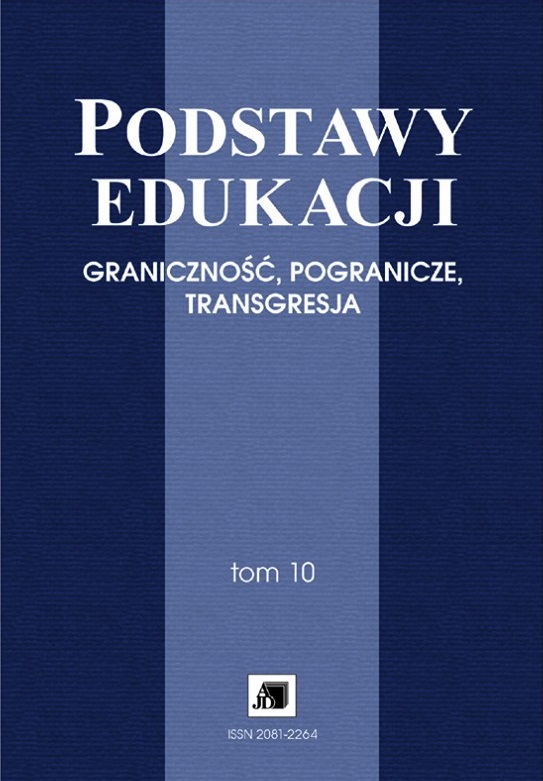Abstrakt
Celem prezentowanego artykułu jest określenie roli i znaczenia tutorów w nauczaniu na odległość, a przede wszystkim w e-learnigu. Analiza literatury przedmiotu pokazuje, że o efektywności tej formy nauczania decyduje nie tylko dostęp do odpowiedniego sprzętu i oprogramowania, ale także czynnik ludzki. Dotyczy to interakcji między uczestnikami zajęć, jak również rozpoznania ich potrzeb, motywacji i monitoringu, za co najefektywniej może odpowiadać człowiek (human tutor), a nie maszyna. Tutor, jako towarzysz, przewodnik, opiekun merytoryczny czy personalny – nawet jeśli jest cyfrowym imigrantem – tworząc dobrą relację z podopiecznymi, staje się dla nich lampą i lustrem, oświetlając bezpieczną drogę, pokazując przebyty dystans, łączy światy. Doświadczenie tego typu wsparcia, obecne choćby na Uniwersytecie Otwartym, może być dostępne w coraz większym stopniu dla polskich uczniów bądź studentów. Ma to związek z procesem wdrażania tutoringu w polskim systemie oświaty oraz szkolnictwa wyższego, który stał się przedmiotem obserwacji naukowych autorki.
Bibliografia
Bertin, J.-C., Narcy-Combes, J.-P. (2012). Tutoring at a distance. Computer Assisted Language Learning, 25:2, 111–127; http://dx.doi.org/10.1080/ 09588221.2011.639785.
Carpentier, A. (1988). Podróż do źródeł czasu. Warszawa: Czytelnik.
Dembiński, P.H. (2001), Globalizacja – wyzwanie i szansa. W: J. Klich (red.), Globalizacja. Kraków: Wydawnictwo PSB.
Díaz, L.A., Entonado, F.B. (2009). Are the Functions of Teachers in e-Learning and Face-to-Face Learning Environments Really Different?. Educational Technology & Society, 12 (4), 331–343.
Dobrowolski, J. (2006), Tutor i uczeń w e-nauczaniu. Języki Obce w Szkole, 2, 83–85.
Fijałkowski, A. (2009). Z dziejów myślenia o tutoringu – krótki zarys historii indywidualnego kształcenia i wychowania. Kwartalnik Pedagogiczny, 2(212), 5–34.
Goban-Klas, T. (2002). Media i komunikowanie masowe: teorie i analizy prasy, radia, telewizji i Internetu. Warszawa: PWN.
Hejwosz, D. (2010), Edukacja uniwersytecka i kreowanie elit społecznych. Kraków: Oficyna Wydawnicza Impuls.
Jelfs, A., Richardson, J.T.E., Price, L. (2009). Student and tutor perception of effective tutoring in distance education. Distance Education, 30:3, 419–441; http://dx.doi.org/10.1080/01587910903236551.
Krämer, N.C., Bente, G. (2010). Personalizing e-Learning. The Social Effects of Pedagogical Agents. Educational Psychology Review, 22, 71–87; https://dx.doi.org/10.1007/s10648-010-9123-x.
Kuźmicz, K. (2015). E-learning. Kultura studiowania w przestrzeni sieci. Sopot: Gdańskie Wydawnictwo Psychologiczne.
Lubina, E. (2004). Zmiany funkcji nauczyciela w nauczaniu na odległość. E-mentor, 4(6), http://www.e-mentor.edu.pl/artykul/index/numer/6/id/80 [dostęp: 25.10.2017].
Morbitzer, J. (2014). Ekspertyza dotycząca zmian uczenia się osób urodzonych po 1990 r. (pokolenie C, pokolenie homo mediens), z uwzględnieniem rekomendacji dotyczących dostosowania metod i treści nauczania, w szczególności e-podręczników, do potrzeb i sposobu uczenia się współczesnych uczniów oraz wyzwań wynikających z rozwoju technologii informacyjnych. Warszawa: ORE.
Sarnat-Ciastko, A. (2015). Tutoring w polskim systemie oświaty. Warszawa: Difin S.A.
Silén, C. (2006). The tutor’s approach in base groups (PBL). Higher Education, 51, 373–385; https://dx.doi.org/10.1007/s10734-004-6390-9.
Sprawozdanie z realizacji rządowego programu rozwijania kompetencji uczniów i nauczycieli w zakresie stosowania technologii informacyjno-komuni- kacyjnych „Cyfrowa szkoła”, https://men.gov.pl/wp-content/uploads/ 2014/02/sprawozdaniecyfrowaszkola-przyjeteprzezrm25_02_2014.pdf [dostęp: 26.07.2017].
Stecyk, A. (2013), Wartość systemów e-learningowych w podmiotach edukacyjnych. Warszawa: Difin S.A.
Topping, K.J. (1994). A Typology of Peer Tutoring. Mentoring & Tutoring: Partnership in Learning, 2:1, 23–24; http://dx.doi.org/10.1080/ 0968465940020104.
Źródła internetowe:
http://thegrannycloud.org/ [dostęp: 14.11.2017].
http://www.kongres.ibe.edu.pl/images/materialy/3KPE-4-5-prezentacjaRenata_Fluder.pdf [dostęp: 14.11.2017].
http://www.newsweek.pl/swiat/gra-pokemon-go-zmienila-naszezycie,artykuly,391894,1.html [dostęp: 30.07.2016].
http://www.openuniversity.edu [dostęp: 20.09.2017].
OŚWIADCZENIE AUTORA:
Mam świadomość, że czasopismo jest wydawane na licencji Creative Commons - Uznanie autorstwa (https://creativecommons.org/licenses/by/4.0/legalcode).
Przesyłając artykuł wyrażam zgodę na jego udostępnienie na tej licencji.
